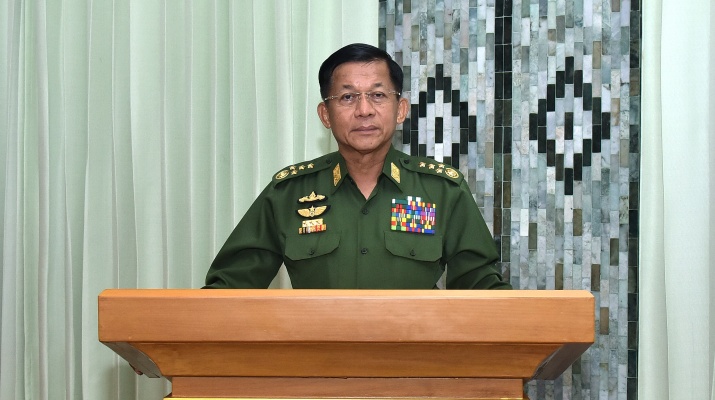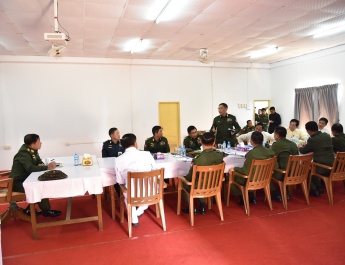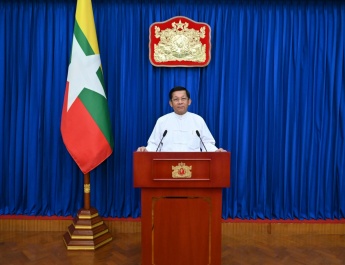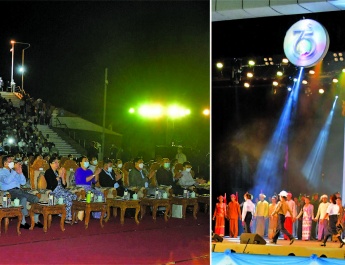Esteemed national brethren, First and foremost, I’d like to express my greetings that may stakeholders in the Nationwide Ceasefire Agreement-NCA on the same occasion of the last five years, all ethnic leaders who contributed to signing the NCA, local and international witnesses, members of the Sangha and people in the Republic of the Union of Myanmar be mental and physical well being and serve the interests for the peace of the State with strenuous efforts.
Today is the 5th anniversary of signing the Nationwide Ceasefire Agreement-NCA. I myself have had an opportunity to sign the agreement. The NCA which was a milestone of Myanmar’s peace process was signed on the same occasion of past five years in the first term of democratic government led by President U Thein Sein. Although the agreement was titled as ceasefire, everybody has known that the NCA consisted of the deeper aims and effectiveness than the ceasefire goal, guarantees for walking along the genuine, firm and correct eternal peace path and the guarantees for building the Union based on democracy and federalism the ethnics inspire.
Our country is home to 135 ethnics. British who extended their colonial areas across the world in the 19th century invaded Myanmar in three aggressive wars and occupied Rakhine and Taninthayi regions in 1824, lower Myanmar in 1852 and the whole country in 1885. Hence, Rakhine and Taninthayi regions were under the British colonial rule for 124 years, the lower Myanmar for 96 years and the whole Myanmar for 63 years.
After the colonialists had occupied Myanmar as a subordinate under their rule, Myanmar lost her independence. The colonialists attempted to end monarchical administration by applying various administrative forms. British colonialists were worried about potentials for strengthening of Bamar in joining hands with ethnics. So, our national brethren should notice that British colonialists promulgated acts, rules and administrative laws to instigate between ethnic areas and central Myanmar for fostering their administrative system as they wished. Such laws and divide-and-rule administrative system caused lesser development of ethnics and misunderstanding between states and mainland. Except extracting natural resources, those colonialists did not emphasize development of Myanmar. For example, it can be seen that Ayeyawady River Bridge was alone. At a time when it was necessary to give independence to Myanmar, they accelerated commitment of instigation for leaving ethnic areas. So, we took a long time to regain the independence. As the Panglong Agreement was approved in unison and signed with Union spirit in 1947, the independent Union of Myanmar emerged.
In observing histories of independence struggles, some countries under colonial rules at that time suffered oppression and instigation. The colonialists attempted to cause civil wars in these countries not to give independence. In unavoidably giving independence, those colonialists applying various ways and means attacked and disintegrated such countries which had already regained independence, for having chance to dominate these countries somehow. Similarly, those colonialists committed instigation in our country not to give independence. At a time when it was a situation to unavoidably give independence to Myanmar, those colonialists committed movements of secession, uprisings and armed insurgencies in the country. In early post-independence period, multi-coloured insurgency dubbed by the people for various colours based on disunity and sectarianism which were evil legacy of the colonialists emerged in the country, and it has been happening till today for more than 70 years. The successive governments taking State responsibilities after regaining independence strived for ending insurgency and restoring internal peace. However, we didn’t achieve full success due to various reasons.
Esteemed national brethren, In the post-independence era, our country practised the parliamentary democracy system. The country was ruled by the Caretaker Government in 1958 and by the government of the Revolutionary Council in 1962. The government of the Myanmar Socialist Programme Party ruled the country in socialism from 1974 to 1988. Due to the unrests which occurred together with democracy movements wishing to practise the multi-party system in 1988, the Tatmadaw took power of the State on 18 September 1988 by upholding Our Three Main National Causes—Non-Disintegration of the Union, Non-Disintegration of the National Solidarity and Consolidation of Sovereignty due to historical process of the State. Peace offers were invited with genuine goodwill and practically initiated. So, ethnic armed organizations accepted peace one after another. As such, peace could be restored in almost all parts of the country. I’d like to inform that the Tatmadaw has been implementing the ethnic cause as that of sibling in successive eras.
Esteemed national brethren, During the administration of Tatmadaw government, all the organizations made peace through Gentleman’s Agreement such as temporary settlement accord, demarcation accord and regional development accord. Moreover, peace was restored in various means as there were some organizations that signed ceasefire agreement but were still holding arms and others that reached arms for peace agreement as they abandoned their arms because of their trust in the government and love for genuine peace. Nowadays, there are political forces that have decided to take part in the elections after setting up political parties, within the framework of 2008 Constitution as well as armed organizations trying to solve the political dispute through other means. Today, the country is ruled by the multi-party democracy system aspired by the people. Multi-party democracy system is the public aspiration. So, all the practices, customs and actions must be democratic. Consequently, the entire peace process must be based on democratic norms and majority consent. So, we must adopt a uni-formed democratic administration in all places in accord with democracy. We must strive to narrow the gaps between rural and urban, states and regions and between one place and another. As an elected government the first democratic administration carried out democracy transition process alongside the internal peace process as a national task during its term that began in 2011. Democratization will be difficult without peace. So, a new chapter was opened by extending peace overtures to ethnic armed organizations on a national scale on 18 August 2011.
Union Peace Restoration Work Committee and representatives of EAOs jointly drafted the Nationwide Ceasefire Agreement-NCA. Based on Laiza conference held on 2 November 2013, NCA was reached. NCA (Draft) the sole nationwide ceasefire agreement was reached on 31 March 2015. I have mentioned these points as knowledge of the struggles and strenuous efforts for peace process, which also took much time and the collective efforts to overcome hardships, and the strength for the following stages of the peace process. The provisions of the NCA were stipulated after holding detailed negotiations chapter wise, article wise, para wise and term wise from the draft version to NCA throughout the six coordination meetings.
Almost all the provisions in NCA were based on the suggestions of EAOs, while the government and the Tatmadaw made coordination. With the participation of 8 ethnic armed organizations, the historic NCA was signed on 15 October 2015 thanks to coordination, patience, high-mindedness and selfless efforts of the members from the government, the Hluttaw, the Tatmadaw and the EAOs. Today is the fifth anniversary. Another two EAOs joined the agreement in 2018. The Tatmadaw recognizes the role of all the participants for their strenuous efforts in the emergence of NCA, which is a hard-won achievement.
Only two more groups joined the NCA four years after it was reached. The following five years could not show any sign of significant progress, and only the parts of Union Accord can be agreed. The country will achieve development sooner if all the armed conflicts end sooner. So, I would urge all to join the NCA soonest to end armed conflicts.
Esteemed national brethren, Though the NCA stands for the Nationwide Ceasefire Agreement, the agreements in the pact are broader than just being ceasefire. It was agreed in the basic principles of the NCA to solve armed conflicts through negotiations; to establish new political culture of solving the political problems through political means and not with military means; and to build permanent peace while guaranteeing equality. As such those principles must be realized based on the results of political dialogue in line with political road map of the NCA. The NCA paves the way from armed struggle to peace, and then to multi-party democratic Union that is based on federalism.
If the Panglong Agreement signed unanimously between the people of lowlands and rugged border areas based on Panglong Spirit (Union Spirit) on 12 February, 1947 is to be called a prelude to independence, it is fair to consider the NCA, which has emerged in our times, as the foundation of peace.
Esteemed national brethren, With respect to ethnic issues, Article 22 of the 2008 Constitution states the Union shall assist to develop ethnic language, literature, fine arts and culture of the national races; to promote solidarity, mutual amity and respect and mutual assistance among the national races; and to promote socioeconomic development including education, health, economy, transport and communication, so forth, of less-developed national races. The Article 49 designates regions, states and Union Territory. Article 56 designates self-administered division and self-administered zones. The Article 261 (b) and (c) appoints region or state chief ministers, and Chapter (8) “Fundamental Rights and Duties of Citizens” enshrines equal rights for people of all races. Regardless of the size of the region and population, and race, it is fair to say all the ethnicities enjoy equal rights.
We Tatmadaw want that region and state chief ministers are elected by their relevant parliaments so that local people can be in a better position to promote their interests, and better enjoy the essence of democracy. Here, we must accept democratic election by the people. In the first phase of democratic transition under the previous parliament, some provisions were amended and added to the Constitution in the interests of the national people.
Our country is a multi-ethnic country, and there are various political parties formed based on political ideologies or ethnic identity or regionalism. There are more than two major parties as well as dozens of smaller parties. Ours is a Union where ethnicities live together. It is therefore crucial for political parties, which will serve various ethnicities and the country, to ensure broad representation in State building. By switching to proportional representation (PR), ethnic people will have greater representation and say in parliaments. Not only ethnic majority, but also ethnic minorities will be able to have greater representation in relevant region and state parliaments, as well as in Pyithu Hluttaw and Amyotha Hluttaw, and effectively serve the interests of their re-
gions and people. Only when we achieve permanent peace, will
we be able to stride toward the Union based on democracy and federalism.
When it comes to peace, the Tatmadaw has strengthened peace efforts by effectively utilizing its capacities. The Tatmadaw goes to the remote areas of national races regardless of mountains or plains and carries out pragmatic tasks to enable the people to lead a peaceful life. Amid the outbreak of COVID-19 across the world, the Tatmadaw takes the affairs of the national races seriously by travelling to the areas of national races and offering assistance for the prevention, control and treatment of COVID-19 to the (NMSP) Mon group, the UWSA (Wa) group, the KIO/KIA, the KNU, the KNU/KNLA(PC), the KKO, the SSPP/SSA, the KNPP, the RCSS/SSA, the NDAA (Mongla) as well as the national races in Naga, Pa-O, Danu, Palaung, Kokang, Wa Self-Administered Zones and the Inlay Region. The Union Accord (Part III) was signed on 21 August 2020 in order to build a union based on democracy and federal principles in the post-2020 period. The Union Accord (Part III) already agreed upon lays out a total of 54 points and the union accords will be submitted to the Hluttaw to be able to restore sustainable peace and build a union based on democracy and federal principles.
Currently, we are undergoing two occasions. One is the outbreak of COVID-19 and another is the election. The second wave of COVID-19 has started since early September this year, infecting tens of thousands of people and claiming hundreds of lives. However, I would like to speak words of encouragement that we don’t need to fear the spread of the pandemic and feel depressed because there is no medicine to cure it. We will be able to overcome it by strictly complying rules and guidelines issued for the prevention of COVID-19 as disciplined citizens. The economy of seven billion people has fallen as the pandemic has spread all over the world but the trading of foodstuffs has not decreased. As food is essential for everyone, I would like to urge all to create personal incomes and national earnings by producing as much food as one can in respective regions. The Tatmadaw is deter-mined to cooperate with the people to promote the socioeconomic development of the people to the best of its abilities during the out-break of COVID-19.
The Multi-party General Election 2020 is just around the corner. Elections are the lifeblood of the multiparty democracy system. It is important that the upcoming election is free and fair. I would like to remind all “to carefully elect candidates who work for the betterment of the country with goodwill and the Union Spread and respect the law.” Only, will the development, democracy and peace desired by the national races be enjoyed to the full extent.
Esteemed national brethren, We have reached a certain period in the history of the NCA we are now undergoing.
As for the Tatmadaw, – It is determined to cooperate with national races to achieve sustainable peace without deviation from Our Three Main National Causes and the NCA process as stability is essential for development of a country and I would like to urge national races to join hands with the Tatmadaw.
– I would like to urge non-signatories to the NCA to sign it in the appreciation of the desire for peace of national races for the emergence of a full-fledged multi-party democratic country based on democracy and federal principles during the lifetime of all of us, and signatories to the NCA to continue to uphold the NCA process and to cooperate in building the future democratic country as strong new forces.
– I would like to urge all to observe and implement the stipulations of the Panglong Agreement by recognizing it as the symbol of the unity of our national races and regarding the NCA as the symbol of peace that drives away conflicts and doubts that have been in existence for many years.
– In conclusion, I would like to urge national races to cooperate as national races will achieve wider representation and will be able to work effectively in the interest of the respective regions and national races by amending the constitutional clauses that should be amended.
Thank you all.





